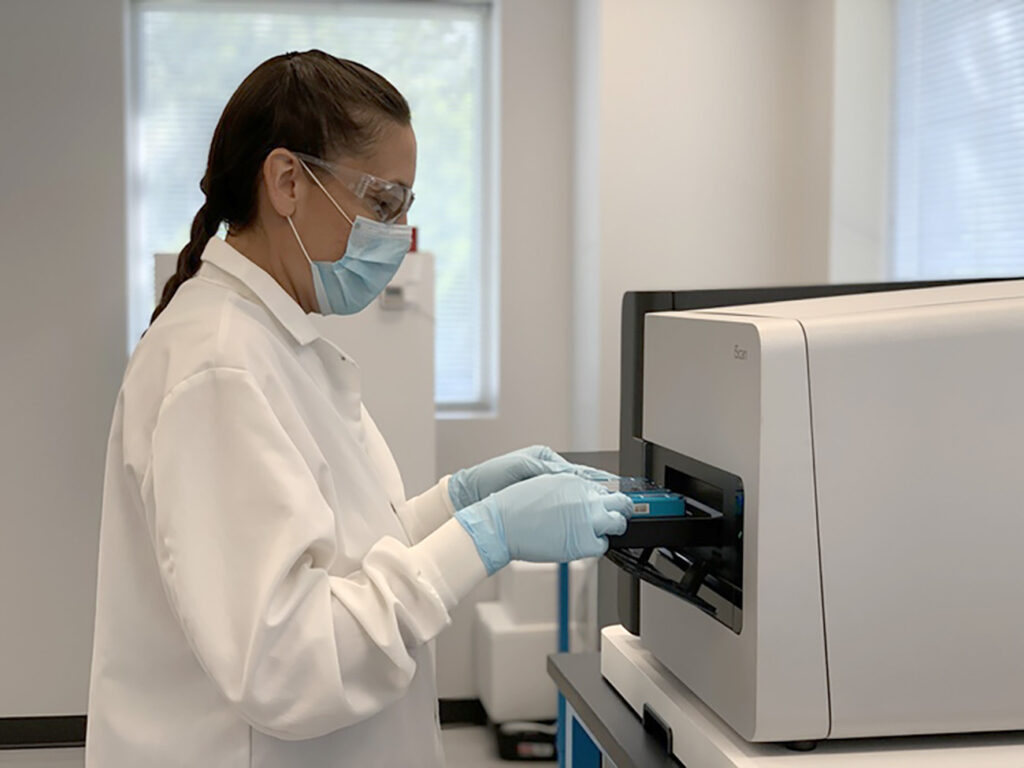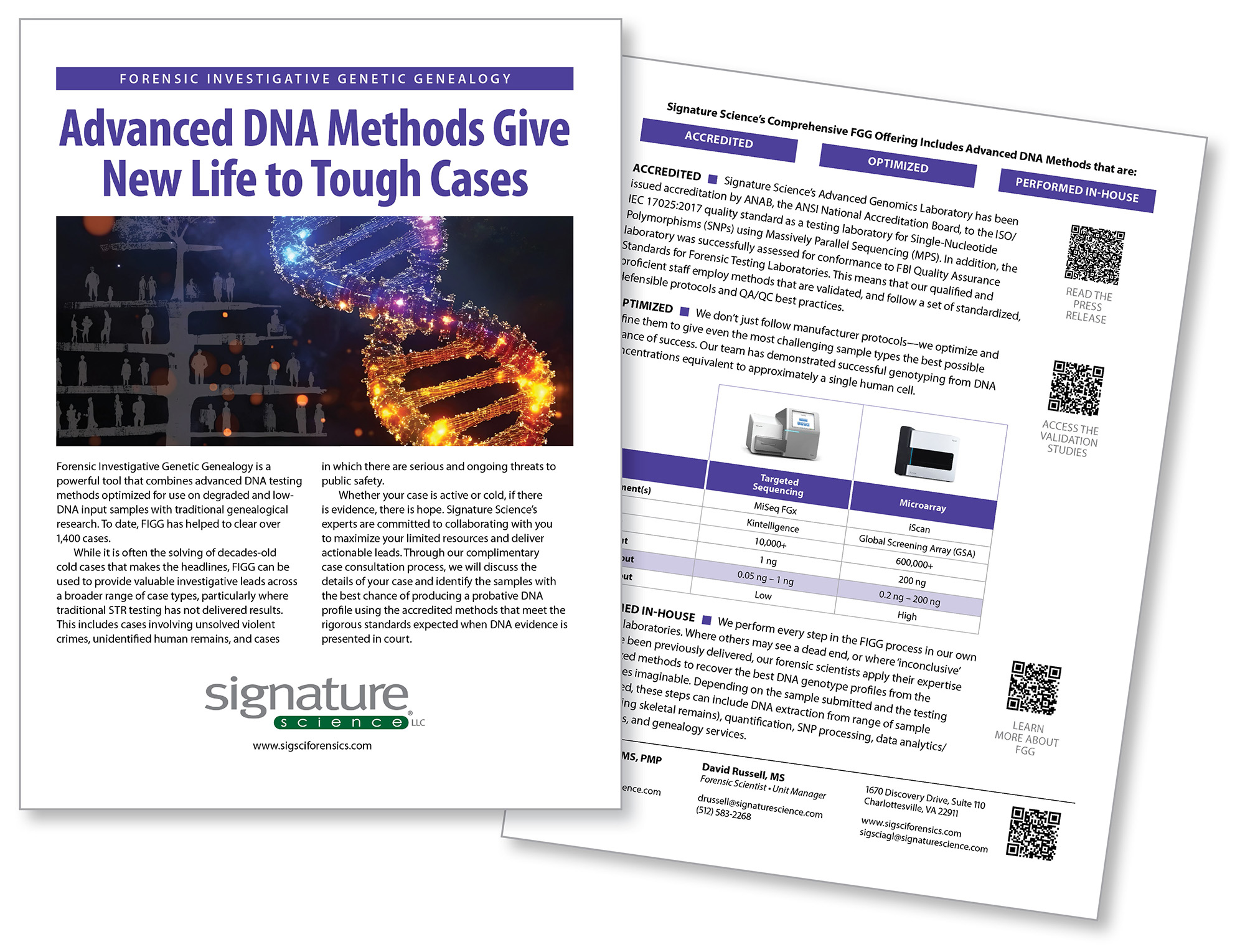A Different Approach to Generating Investigative Leads

Forensic genetic genealogy (FGG) is a different approach to develop investigative leads for your violent crime cold case or active case that has not returned a DNA match in the CODIS database. FGG applies advanced DNA laboratory analysis, called SNP genotyping, which determines differences in an individual’s genetic make-up by examining one’s DNA sequence. Once identified, genotype data is uploaded into public genetic genealogy database(s) authorized for law enforcement use to search for familial links. Genetic genealogy researchers use the familial link to identify investigative leads to potential suspect(s). The resulting genealogy research is delivered to the case investigator for lead follow up.
Signature Science’s ANAB-accredited Advanced Genomics Laboratory provides our clients with high-quality extraction and analysis services, every time. Accreditation Certificate (PDF, 154kb) and Scope (PDF, 145kb).

In-House DNA Genotyping for Best Results
At Signature Science, we perform the DNA genotyping in our own lab – we do not outsource this crucial first step! Why? Because where others may see a dead end, our forensic scientists use their expertise to get the best DNA genotype profiles possible from the worst samples imaginable. Our validated lab methods can provide investigative leads from DNA inputs 1000x lower than industry standards, giving you the best shot at solving your case. The quantity and quality of your DNA sample determines your testing options. Our team can recommend which of your case samples are best for genotyping and which method has the greatest chance for success.
Signature Science Has a Validated Method to Help Solve Your Case
| FGG Service Specifications | Infinium® Global Screening Array (GSA) (Illumina®) | ForenSeq® Kintelligence (Verogen®) |
|---|---|---|
| DNA Input Required | 0.2 ng gDNA | 50 pg gDNA |
| Processing Time | 60 days (standard); Expedited Processing available | 60 days (standard); Expedited Processing available |
| Genetic Genealogy Database Compatibility | GEDmatch Pro; FamilyTreeDNA | GEDmatch Pro; FamilyTreeDNA |
Mixture Resolution
To enable the analysis of two-person mixtures for FGG, we are validating a Kintelligence workflow, MixDeR, for the deconvolution of mixed SNP profiles. Our application of this mixture resolution tool lifts the constraints of genealogical database search algorithms, which are designed for use with single-source profiles.

PDF; 447kb
FAQs
What is the FGG Case Review Process?
Our team of forensic scientists, bioinformaticians/data scientists, and genealogists, works closely with law enforcement clients to determine if their case samples are suitable for genotyping and compliant with the current U.S. Department of Justice policy on FGG DNA analysis and searching.
Criteria include, but are not limited to:
- Case involves an unsolved violent crime, and the candidate forensic sample is from a putative perpetrator, or unidentified remains of a suspected homicide victim (‘unidentified human remains’).
- The forensic profile derived from the candidate forensic sample must have been uploaded to CODIS, and subsequent CODIS searches must have failed to produce a probative and confirmed DNA match.
A checklist containing all the minimum requirements for the candidate samples will be provided as part of the initial request for candidate sample submission for FGG. Case review will conclude with a conference (via video or telephone) between Signature Science and a designee to report the conclusions of the review and to determine and authorize the final workflow on a case-by-case basis.
The current DNA input requirements are ≥ 0.05 ng/µL in a minimum volume of 10 µL for GSA and 0.04 ng/µL in up to 25 µL for Kintelligence. We currently require samples to be single source but there are some exceptions that depend upon the ratio of major to minor donor in the sample.
How are samples quantified and processed?
Candidate sample(s) (items and/or extracts) submitted for FGG are extracted (if necessary) and first quantified using the Investigator® Quantiplex® Pro Kit to ensure sufficient quantity and quality are present for genotyping. Depending upon quantity and quality and thorough discussion with Law Enforcment, the forensic scientists will help guide the best FGG service (GSA or Kintelligence) to use to obtain the best results for your sample(s).
The Infinium Global Screening Array is a genome wide genotyping method that provides ancestry, identity, and phenotype (hair/eye color) markers along with extended kinship markers. This method allows for higher sample throughput while maintaining low DNA input requirements.
Kintelligence, an integrated FGG solution based on next-generation sequencing technology, targets forensically relevant markers along with ancestry, identity, and phenotype (hair/eye color) markers to estimate kinship.
Each is optimized for degraded and low-input DNA samples from a range of sample types including blood, bone, buccal swabs, hair, teeth, semen, and touch DNA (e.g., tape and spent shell casings). Further, Signature Science has genotyped cremains and burned and surface-decomposed bone indicating the ForenSeq Kintelligence performs well with highly degraded remains, which can sometimes be challenging for array methods.
Will FGG work for low-input or degraded samples?
Signature Science’s demonstrated successful genotyping with DNA input levels down to 0.2 ng, three orders of magnitude lower than the manufacturer’s recommended input of 200 ng.
Our GSA method is optimized for challenging and low-input DNA samples from a range of sample types including blood, bone, buccal swabs, hair, teeth, semen, and touch DNA (e.g., tape and spent shell casings).
Similarly, our Kintelligence method is optimized for degraded and low-input DNA samples from a range of sample types including blood, bone, buccal swabs, hair, teeth, and semen. Successful genotyping, eligible for GEDmatch Pro upload, has also been shown from degraded samples (e.g., bone) with various insults including cremation, embalming, and surface decomposition.
How will data be analyzed and uploaded to reference databases?
Microarray data are visualized and analyzed using Illumina’s GenomeStudio® software. The data generated undergo rigorous quality assessment, followed by data preparation and upload into GEDmatch for finding genetic relatives. Formatted data are uploaded into FamilyTreeDNA on a case-by-case basis. Additionally, upon request, data can be analyzed to provide phenotypic information such as biogeographic ancestry and hair, eye, and skin color.
Kintelligence workflow data analysis component is performed with the Verogen ForenSeq Universal Analysis Software, and long‑range kinship estimation in GEDmatch Pro informs the construction of a family tree.
How are investigative leads generated?
Genetic genealogy research is performed on the DNA data output file(s) from the genealogical database(s) with the goal of generating leads for our law enforcement clients. Through this process, leads such as ethnicity composition, surnames, familial geographic locations, and DNA relatives may be reported. Each individual piece of information collected is considered a lead and is reported to our law enforcement client.
Are there third party funding options for my case?
In the interest of solving more violent crimes, several organizations and nonprofits provide grant funding to law enforcement for FGG services. These funds can help subsidize the costs of advanced DNA testing methods, and help your agency solve its toughest cases. Start your search.
